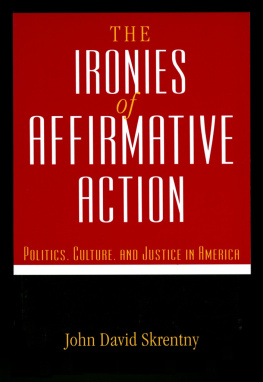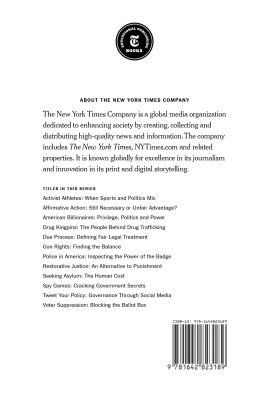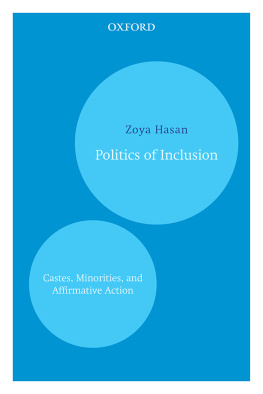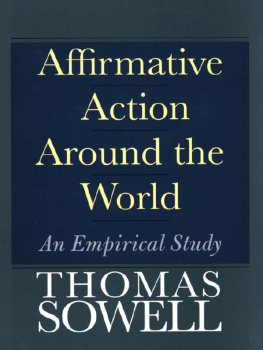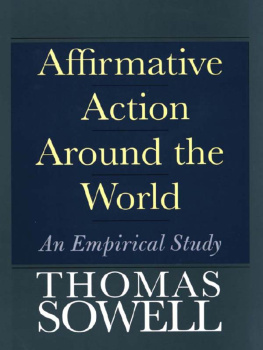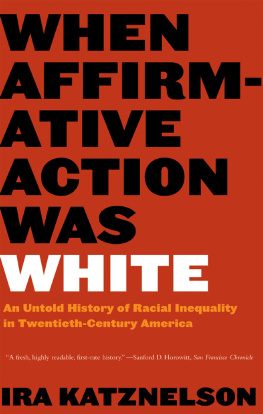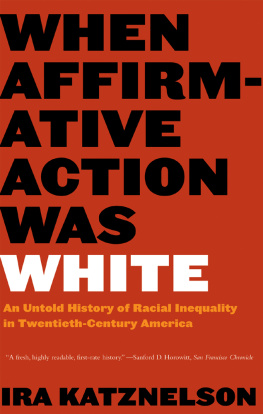The University of Chicago Press, Chicago 60637
The University of Chicago Press, Ltd., London
1996 by The University of Chicago
All rights reserved. Published 1996
Printed in the United States of America
09 08 07 06 05 04 03 02 01 00 3 4 5 6 7
ISBN 0226761789 (ppbk)
ISBN 9780226216423 (ebook)
Library of Congress Cataloging-in-Publication Data
Skrentny, John David.
The ironies of affirmative action: Politics, culture, and justice in America / John David Skrentny.
p. cm.(Morality and society)
Includes bibliographical references and index.
1. Affirmative action programsUnited States. I. Title. II Series.
HF5549.5.A34S57 1996
331.13'3'0973dc20
95-36820
CIP

The paper used in this publication meets the minimum requirements of the American National Standard for Information SciencesPermanence of Paper for Printed Library Materials, ANSI Z39.481992.
PREFACE
Readers may justifiably expect this book to have a political agenda, either for or against affirmative action, since almost everything written about that controversial policy has such an agenda. This book, however, has no political agenda, unless one considers the desire to question fundamental assumptions on both sides and move tired debates forward to be a political agenda. The goal of the book is to use sociological and historical tools to show why conservatives resist affirmative action and liberals support it. If social scientists can find ideas that will help them better understand or rethink their study of American politics, policy, or law, and if interested individuals on both sides of the issue can find ideas that will help them better understand or rethink their positions on affirmative action, the book will have succeeded.
The topic has long been a sensitive one, and in the beginning stages of my research, I was warned many times of this sensitivity. I ran the risk that many would regard my contribution as yet another ideological tract. I was committed to the research, however, because I was committed to the simple idea that as social scientists go about refining their understandings of the fundamental workings of society and politics, some should remember to study the specific issues that Americans care about in the process of this theoretical refinement. I felt that sensitive issues were precisely the ones which needed study.
I did not come to study affirmative action because I was fascinated with this particular topic; I came to it because I was fascinated with the sources and dynamics of political controversy. In search of a suitable research topic, I was reading widely, simply looking at books and articles on political controversy and change that sounded particularly interesting. It was in Daniel Bells The Coming of Post-Industrial Society (New York: Basic Books, 1973) that I ran across a sentence which I could not forget. It happened to be about affirmative action: What is extraordinary about this change [to affirmative action] is that, without public debate, an entirely new principle of rights has been introduced into the polity (p. 417, emphasis added). I agreed with Professor Bell that affirmative action represented something new, and I knew that it was very controversial, with public opinion going decidedly against it. But I had not considered that it had become policy without public debate. It was an apparently anomalous policy victory for a group usually assumed to be far from the center of power. How did it happen? It seemed a fantastic sociological puzzle.
I was especially attracted to just this sort of question because, as an undergraduate major in both sociology and philosophy, I had become interested in the relationship between ideas of justice or morality and the social policies that Americans actually support. Every moral philosophy has been thoroughly criticized through logical argument; how was it that modern people could nevertheless be strongly committed to various ideals that were logically full of holes? And what was the relationship, if any, between the ideals of justice and morality that are extolled over and over in political discourse and the policies that are actually enacted and implemented? The puzzle of affirmative action seemed a perfect case for the exploration of these questions. This book is the result of that exploration.
When I began in 1991, the affirmative action debate was showing many signs not of cooling down but of stabilizing. Since late 1969, quotas were decried but racial preferences were politically possible. The issue was debated throughout the 1970s, 1980s, and early 1990s, though there was little movement, and when I sent the final version of the manuscript to Chicago in January of 1995, this was where the debate still stood. In that version, I predicted the new Republican majority in Congress would likely turn their sights onto affirmative action and begin an attack not just on quotas but on preferences.
But I did not think it would happen so soonjust a matter of weeks after I sent my manuscript. Though off the radar screen in the congressional races of 1994, the affirmative action issue exploded in February 1995. The news media was abuzz with analyses of affirmative action. Some on the Left pointedly decided to abandon the policy altogether, others remained committed, while sometimes trying to make the beneficiaries of affirmative action seem more deserving, by emphasizing that women benefit from the policies (and not just blacks). Still others tried to co-opt the enemy by making angry white males potential beneficiaries of a new class-based affirmative action.
Despite the change in the debate, much has remained drearily the same and the analysis in this book offers insight for better understanding. The arguments on the Right still reflected the utopian assumption that America would be a meritocracy were it not for affirmative action and the incorrect assertion that the government could never support or tolerate preferences. Moral worthiness is the dominant issue, as it was before, and this is still rarely recognized explicitly. The Left still tried to find ways to defend a policy with little knowledge of where the policy came from and little recognition of its political liabilities. Explaining this situation was one of my original objectives and, despite the renewed and changing debate, I made only minor changes to the book.
A great many generous people have helped me in my investigation of the puzzles and ironies of affirmative action (though none, of course, are responsible for any of this books shortcomings). At Harvard University, Orlando Patterson agreed to supervise the project when it was still in its dissertation stage, and his creativity, constructive criticism, open-mindedness, and intellectual support were essential for the completion of the project. His consistent emphasis on the importance of context in studying social phenomena was a lesson of enduring value. I was fortunate to have Nathan Glazer, one of the most prominent commentators on affirmative action, on my committee, and his ideas and willingness to share his experiences gave the project a sense of history and showed where new work needed to be done.
As I did the research a framework for understanding gradually came into place. It was difficult, however, to link these ideas with the current debates in social and political analysis. Yasemin Soysal showed me that my framework was similar to that of institutional perspectives in sociology, and tirelessly answered my questions as I struggled to see where my voice fit into the conversation. As the project went deeper into the workings of American politics, Theda Skocpol was kind enough to provide guidance with regard to the patterns of the politics of social policy. I did not know at the outset that the answers to the puzzle of affirmative action were to be found through study of administration, the courts, and the presidency, but I became fascinated with this aspect of the project, and her renowned expertise was a great resource. Others at Harvard were generous with their time and their insights, especially David Riesman, Daniel Bell, and Jason Kaufman; but also Victoria Alexander, Liah Greenfeld, Randall Kennedy, Martin Kilson, and H. W. Perry. That I critique some of these scholars views in the pages that follow is testament of the great influence they have had on my own thinking.
 The paper used in this publication meets the minimum requirements of the American National Standard for Information SciencesPermanence of Paper for Printed Library Materials, ANSI Z39.481992.
The paper used in this publication meets the minimum requirements of the American National Standard for Information SciencesPermanence of Paper for Printed Library Materials, ANSI Z39.481992.
